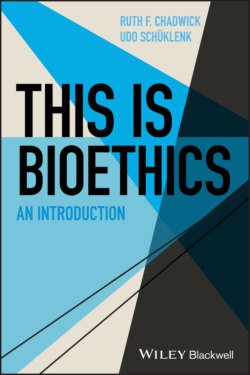Читать книгу This Is Bioethics - Udo Schüklenk, Ruth F. Chadwick - Страница 26
2.6 Contract Theory
Оглавление2.36 Contractarianism 21 – not to be confused with contractualism22 (Kumar 2013) – is really a theory in political philosophy, but it has a significant impact on many areas of concern to bioethics. Initially it was proposed by philosophers such as Thomas Hobbes and David Gauthier with a view to giving an account of political authority. The basic idea here is that any system of government that the citizens of a given state could agree on would wield legitimate authority. Of course, this very idea of informed, voluntary agreement makes contractarianism also a suitable foundation of an ethical theory.
2.37 John Rawls, a neo‐Kantian, offered in his A Theory of Justice a contractualist way of using this hypothetical social contract as a means to arrive at particular fundamental ethical or political rules for society. Contractualism has prominently been proposed by philosophers such as Immanuel Kant and T.M. Scanlon. Rawls proposes a two‐step strategy: First he asks us to imagine that we wanted to create rules for a society in which we would want to live and that we would be happy to abide by. In order to avoid any bias on our part Rawls asks us to imagine that we are behind what he calls a ‘veil of ignorance’, that is, that we would have no idea as to whether we would be rich or impoverished, healthy or chronically ill, an ethnic minority member or a member of the predominant ethnic group, male or female, gay or straight, etc. He quite rightly thought that this would eliminate any egoistic biases from the rules that we would likely come up with. This isn’t dissimilar to the demands of impartialist and universalist approaches to ethics that we have become acquainted with already. Given that you wouldn’t know whether you’re rich or poor, so Rawls thought, you would likely aim for a centrist view, for instance providing minimum basic health care to everyone regardless of ability to pay, just to be sure that if you were impoverished you would not end up dying a preventable death due to lack of the financial wherewithal to cover your hospital bills. Equally you would likely not go overboard with the level of health care provision because of the onerous cost implications – after all, many people seem reluctant to pay high taxes for this level of health care. Norman Daniels, a Rawls inspired philosopher, has suggested that what we ought to prioritize is a given ill person’s return to what he labeled species typical normal functioning23.
2.38 Critics of this kind of theory have noted that the very foundation of contractualism is deeply problematic. Essentially it offers an exclusive reliance on enlightened self‐interest. Critics have questioned whether this could actually function as the normative foundation of a sound ethical theory. Rawls and his followers assume that this enlightened self‐interest would result in particular practical choices on the policy level. The problem is, simply put, they could be wrong. What if citizens actually chose to gamble all on being wealthy and healthy and so instead opted for no publicly funded provision of health care at all? Would their choice then become any more ethically acceptable just because of how it came about? Equally, if the basis of morality is rational egoism, as this strategy seems to suggest, what would stop dictators from behaving as dictators usually do, as long as they could be reasonably confident that their victims would never end up in a situation where they could take revenge?
2.39 This concludes our brief overview of influential ethical theories and approaches that have a significant impact on bioethical reasoning. Let us have a closer look now at bioethics itself.
